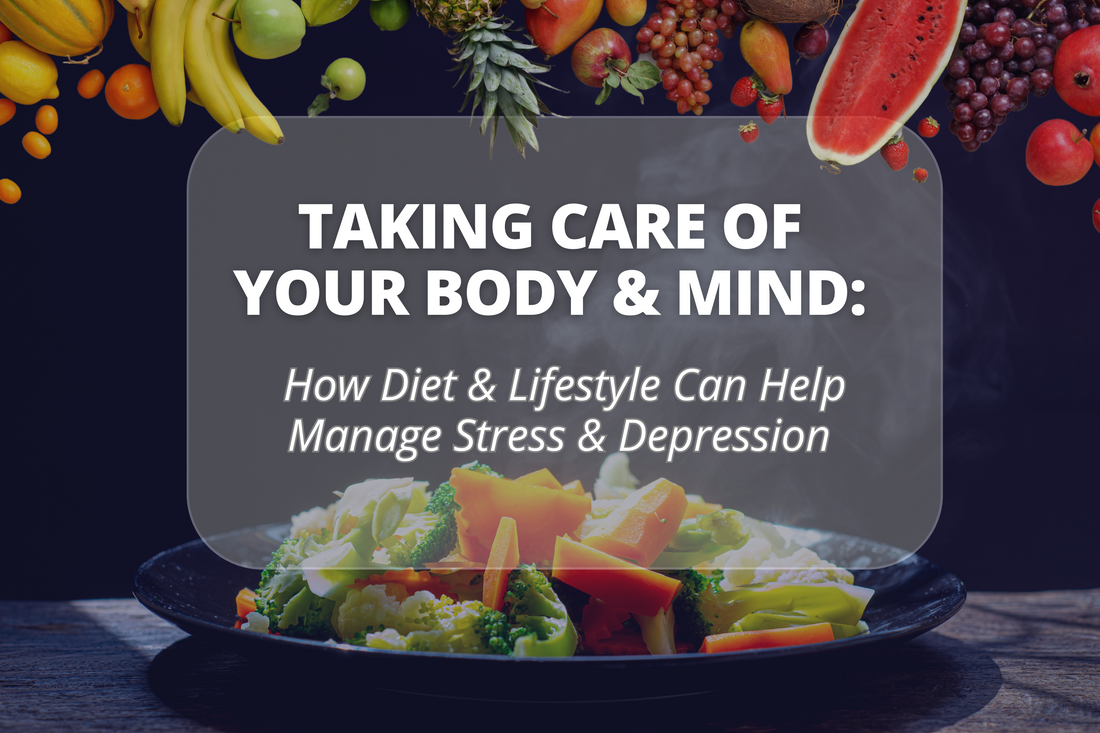Feeling overwhelmed and anxious? Struggling with depression or low mood? I know the feeling, I wear lots of different hats being a human, female, wife, mother, grandmother, daughter, friend and entrepreneur. It’s so important to remember that taking care of your physical health can help manage your mental health. Eating healthy, managing stress, exercising regularly and getting enough sleep are all important components of a healthy lifestyle that can help to reduce stress and depression.
If you’re feeling stressed or overwhelmed, the last thing you want to do is go on a strict diet. But proper nutrition can be the key to helping you better manage your stress and depression. Eating the right foods can provide your body with essential vitamins, minerals and nutrients that can help regulate your mood, energy levels and overall well-being.
Firstly, try to focus on eating a variety of fruits, vegetables, lean proteins, whole grains and healthy fats. This combination of foods will give your body the fuel it needs to stay energised and create a sense of balance. Avoid processed foods and refined sugar as much as possible because they are high in sugar and unhealthy fats which can make you feel sluggish and drained. It’s important to stay hydrated by drinking plenty of water throughout the day. Adding nutritional supplements are a great way of supporting yourself during these times as they can support your energy, mood and wellbeing.
Making small changes to your diet can really make a difference and making sure you eat! There’s lots of research pointing to the Mediterranean diet as a good option to follow. Include foods that are rich in omega-3 fatty acids such as salmon, walnuts and flaxseeds, as these can help boost your mental health. Try to reduce your intake of caffeine, alcohol and artificial sweeteners, as these substances can lead to increased stress and anxiety.
Regular exercise is also an effective way to manage stress and depression. Exercise releases endorphins, which are hormones in the brain that make you both physically and mentally feel good. Physical activity can also help you refocus your mind and reduce feelings of anxiety.
Start by finding an activity that you enjoy - it could be anything from walking, running, swimming or cycling to playing sports, dancing or yoga. Aim to be active for at least 30 minutes a day, and if you don't have the time, break up your exercise into smaller chunks throughout the day, even a well deserved walk around your block.
Additionally, take some time each day to practice deep breathing exercises and mindfulness. These activities will help you change your focus from negative thoughts to something more positive and calming.
Finally, it's important to find healthy ways to cope with stress and depression. Make time to connect with family and friends, talk about your feelings and get support. If talking to those close to you isn't an option, consider joining a support group or seeking professional help.
Create a routine that works for you and stick to it - scheduling certain activities, like going for a walk or reading a book, at the same time each day can help create a sense of structure and consistency. Make time for yourself, whether it's through meditation, listening to music or taking a hot bath.
It's also important to get enough sleep. Try to aim for 7-9 hours per night of precious sweet dreams and make sure to avoid screens before bedtime.
Taking care of yourself is one of the most important things you can do to better manage stress and depression. A healthy diet, combined with regular exercise and plenty of rest, will help to boost your mood and energy levels. And don’t forget to take time for yourself and make sure to practice self- care.

